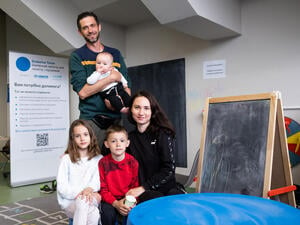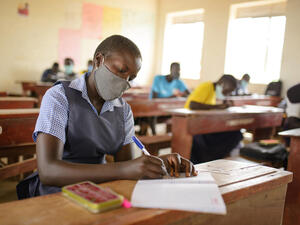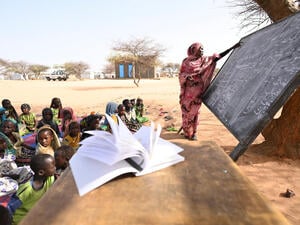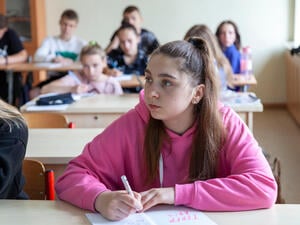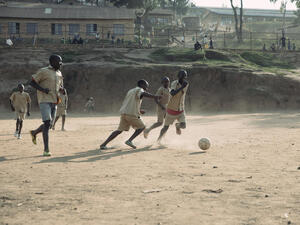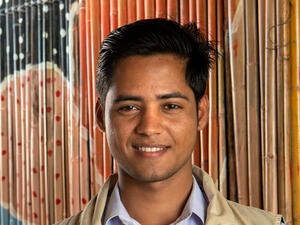Q&A: Former child soldier speaks out for those without a voice
Q&A: Former child soldier speaks out for those without a voice

Ishmael Beah, former child soldier.
WASHINGTON, D.C., United States, June 29 (UNHCR) - Ishmael Beah, a former child soldier from Sierra Leone, recently published his best-selling memoir, "A Long Way Gone." At the age of 12, Beah fled his home and family following an attack by rebels and began to wander the turbulent West African country in search of safety. At 13, he was picked up by the government army and forced to fight with them for two years. Beah was eventually released and sent to a UN Children's Fund (UNICEF) rehabilitation centre. From there, he moved to the United States where he attended high school and college and has since become an influential advocate and writer. Beah recently sat down with Carly Stadum, UNHCR public information intern in Washington, to discuss his life. Excerpts from the interview:
Why did you write "A Long Way Gone"?
I wrote it for the kids and the people who continue to be dragged through this war. I wrote it because I felt that there was a need to really move people; I felt that there needed to be another step to get to people's hearts, so that people can pay attention to this issue.
Do you think your book has raised awareness about the plight of child soldiers and refugees?
I think it has done quite a lot. One of the jokes that I make, but I do mean it, is the fact that once this book became popular, people understood that Sierra Leone is a country, that people live there, that they are as human as people are elsewhere - to me, that's something. It's a starting point, because before no one knew about Sierra Leone. I hope that when people read the book, they're able to connect to the people that they read about. They see that they're only human beings having a difficult time through war. They can't turn away anymore, they've made that human connection that they go on and find more information about this country.
What kind of impact has your book made?
I think that when you expose people to a war you can get rid of a lot of misperceptions. For example, the average person who doesn't know about a country. When a refugee [from that country] tries to seek asylum, that person doesn't have any sort of compassion for them because they have never heard of where the refugees are from and who they are. When they are exposed to what is going on around the world - for someone to walk through the desert, thousands of miles - then they know for someone to struggle so hard, that something must be wrong where they are coming from. When people have this exposure, they treat people more humanely.
How has being a refugee and child soldier affected your work?
I'm able to appreciate what I have here so much more than people who have never lost anything. I have had so many opportunities and I've tried to use my experience as a way to speak for those who don't have opportunities, so they too can have them. It's so easy to come to the US and to forget about what you've left behind. But those who have come here and have a lot need to tell people about how it is where we're from. Many bad things happen in Africa, but there are also good things that happen there. We need to paint those pictures as well in people's minds, because ... that resilience, that spirit, that strength, that courage to survive, to continue living, doesn't come from empty space. It comes from these cultures that we grew up in before they were disrupted.
How did you become involved in advocacy work in the US?
When I came here and realized that most people didn't even know that my country existed, I understood that I could get angry or I could try to educate people. So I decided to speak about where I was from and slowly I started to speak about my experiences. Most people haven't seen someone who was not only dragged into war as a child but also survived it. When they hear about it, it seems so far away. I wanted to speak about it, so people see that it isn't so distant, that the problem is not just an African problem but a worldwide problem ... and that there is a need for people to pay attention. So I started speaking. I think that when you show how communities, how families are disrupted, then there's a human element to it that people see - that these people's lives were just like theirs until they were destroyed. You need to give people a context.
How can writers raise more awareness about refugees and child soldiers?
More can always be done, because not only do you want to warn people, but you want to keep reminding them about the needs. The issues are bigger than me and they continue in several different countries - so you can keep reminding people. I would never claim that I understand every refugee situation, or that I understand every child soldier. I would never say that, because I have lived the life, I may have some understanding more than other people. I am not an expert. When people see your story is genuine, they are willing to learn more.
Have you looked at ways of providing opportunities for others like yourself in Africa to use writing, or other art forms, to express themselves?
I have a foundation that I'm creating. One of the things that will help people in Sierra Leone who have gone through the war and the refugees who have returned with nothing, is to give them opportunities to do something with themselves. In terms of healing, everyone has their own way of healing. Writing helped for me, but that doesn't mean that it helps everyone. Some people might not want to remember at all, and that's their way of healing. I want to empower people through education, using my spotlight in the media to raise funds. I want to build a literary centre where I would have kids coming to check out literature and to read for fun. Growing up as a kid, we never read for fun. Because there were no books, there was never that culture of reading. People couldn't afford books.
Do you have a message for the displaced of the world?
My message to them is be patient - and always hopeful - because sometimes it might seem things will never change, but they could change. Also, things don't change overnight, especially when you move to a new place. I think that a lot of people think that if you just step on US soil the next day you will make money. It's not that easy, so be patient, and be open, because openness itself is a strength that allows you to stay alive and continue to outlive those struggles. Also, be proud. Never doubt your humanity. Hold on to your culture because that's really what makes you who you are.


